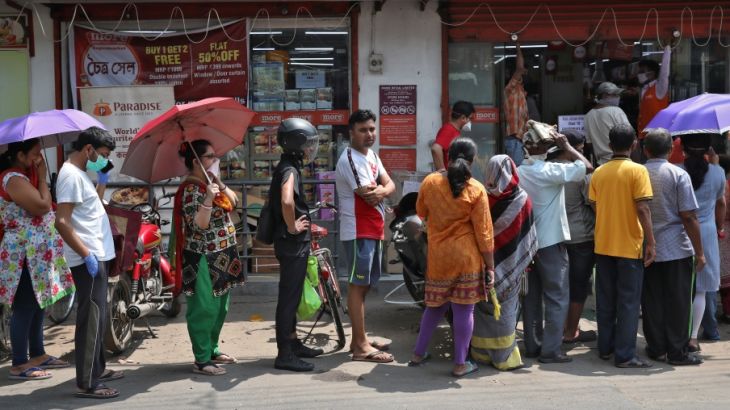India declares 21-day ‘total lockdown’ as coronavirus cases rise
India’s 1.3 billion people to begin world’s largest virus lockdown after PM Modi makes announcement in a TV address.

India’s 1.3 billion people will go under “total lockdown” for 21 days to combat the spread of the coronavirus pandemic, Prime Minister Narendra Modi said, warning that anyone going outside risked inviting the virus inside their homes, and pledging $2bn to bolster the country’s beleaguered healthcare system.
“From 12 midnight today [1830 GMT Tuesday], the entire country will be in lockdown, total lockdown,” Modi said on Tuesday in a televised address, his second in a week.
Keep reading
list of 3 itemsCoronavirus: Travel restrictions, border shutdowns by country
Map: How many coronavirus cases does each Indian state have?
“To save India, to save its every citizen, you, your family… every street, every neighbourhood is being put under lockdown,” he said, putting nearly one-fifth of the world’s population under lockdown.
India has lagged behind other nations in the number of COVID-19 cases, but there has been a sharp increase in recent days to 519 infections, including 10 deaths, according to the government.
Earlier on Tuesday, police enforced lockdowns across large parts of India put under curfew, as health officials warned that the coronavirus was spreading out of big cities, where it first appeared, into smaller towns.
Health researchers have warned that more than a million people in India could be infected with the coronavirus by mid-May
India has already severed international flight links and will stop domestic air services at midnight in a bid to halt the spread.
Fears of virus spreading
There are fears in India about the virus spreading into impoverished communities and the ability of resource-starved public health sectors to cope.
A health official in the western state of Maharashtra said new cases were starting to appear in small towns after a first wave emerged in big cities like Mumbai.
“This trend is worrying as rural areas have limited infrastructure to deal with the outbreak,” said the state health official who declined to be identified, saying he was not authorised to speak to journalists.
States have been imposing their own lockdowns and have been suspending train and bus services and ordering traffic off the roads.
A new concern in the northern Indian state of Punjab was the risk of infection from an estimated 90,000 overseas Indians who had travelled back to their ancestral homeland, the state government’s top health official, Balbir Singh Sidhu.
Many people from Punjab live in Britain, the United States and Canada and travel back in the cool winter to visit.
A team of scientists based mainly in the US said this week that India’s tally of infections could jump to 1.3 million by mid-May if the virus maintains its rate of spread.
“Even with the best-case scenarios, probably, you are in a very painful crisis,” said Bhramar Mukherjee, a professor of biostatistics and epidemiology at the University of Michigan who was involved in the study.
More than 377,300 people have been infected by the coronavirus globally, and 16,520 have died, according to a Reuters tally.
Breaking up Delhi protests
Earlier on Monday, police in the Indian capital broke up the longest-running protest against a new citizenship law, citing a ban on public gatherings because of the coronavirus.
Dozens of people, many of them women, had been staging a sit-in protest since early December on a street in the Shaheen Bagh neighbourhood, turning it into a focal point for opposition to the law seen as discriminating against Muslims.
Hundreds of police in riot gear surrounded the protesters and told them to leave, said Delhi’s joint police commissioner, DC Srivastava.
“It is a dangerous environment, with this coronavirus,” he told reporters.
Some demonstrators resisted the police, and at least nine people had been detained, six of them women, Srivastava said, adding there was no violence.